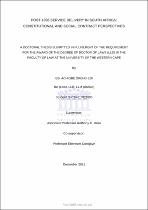| dc.description.abstract | The human rights movement, which emerged after the end of the Second World War, has created consensus in the international community that basic social amenities are indispensable for human development. These amenities are increasingly accepted as fundamental human rights in national constitutions, with varying degrees of judicial enforceability. However, the efficient provision of basic amenities by states remains a problematic issue in the global South. It is particularly challenging in South Africa, where the introduction of democratic governance after many decades of repressive rule aimed to heal the discriminatory divisions of the apartheid past and establish a society based on equity, dignity, and social justice. Unsurprisingly, the 1996 Constitution makes service delivery a shared obligation among the three spheres of government. | en_US |

